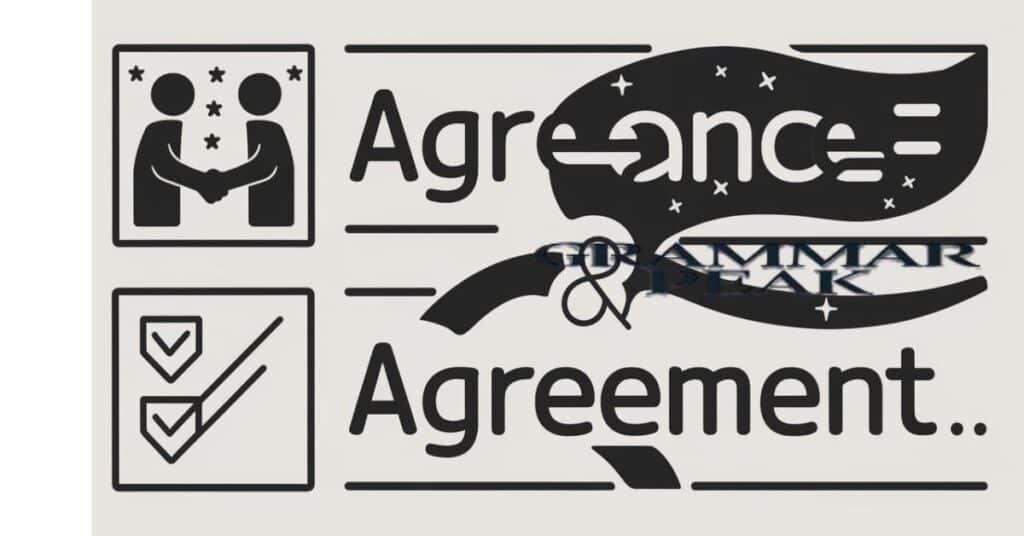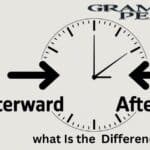It is important to understand the meaning of agreeance and agreement to promote right communication. These two words are commonly confused by most people. This misconception leads to misinterpetations in day-to-day as well as official communications.
In this post, we’re going to explore what these terms mean, how to use them, and where they originated from. We’ll add some examples so that you can choose the correct word in varied situations. When we’re done, you’ll completely grasp agreeance vs agreement and how to use them like a boss.
What do they Mean?
Agreeance
Agreeance is a term that some people use to describe a state of agreement. It is often found in informal communication. For instance, you might hear it in casual conversations among friends or in social media posts.
However, it is important to note that agreeance is not widely accepted in formal contexts.In many cases, using agreeance can lead to confusion. People may not recognize it as a legitimate word. This can undermine your credibility, especially in professional or academic settings.
Agreement
Agreement is the standard term used in both formal and informal contexts. It signifies a mutual understanding or consensus between parties. For example, in legal documents, the term agreement is crucial. It outlines the terms and conditions that all parties must follow.
In everyday conversations, you might say, “We reached an agreement on the project deadline.” This usage is clear and widely accepted. Agreement can also be used in various scenarios, such as business communication, negotiations, and personal relationships. Its versatility makes it a preferred choice in most situations.
You will like Agreeance vs Agreement: Which One to Use?
“Agreeance” or “Agreement”: Which One Should Be Used?
“Agreeance” or “Agreement”
- Many professionals prefer “agreement” over “agreeance” to maintain clarity in legal discussions.
- The term “agreeance” can sometimes create confusion in professional environments.
- During negotiations, it is best to stick with “agreement” instead of “agreeance” for clarity.
- Some teams may feel more comfortable using “agreeance” in informal brainstorming sessions.
- In contracts and legal documents, “agreement” is the only appropriate term to use.
- The preference for “agreement” over “agreeance” underscores the importance of clear communication in business.
Here’s a table that compares the use of the terms “Agreeance” and “Agreement”:
| Agreeance | Agreement | |
| Origin | Scottish English | Old French (“Agreement”) |
| Usage | Less formal, more colloquial; limited to certain regions and contexts | Widespread and universally accepted; used in both formal and casual contexts |
| Meaning | A state of agreement or harmony | A mutual understanding or arrangement between parties; often denotes a formal contract |
| Cultural Influence | Scottish culture and regional dialects | Widespread English-speaking cultures, including legal and business contexts |
| Preference | Usually preferred in casual, informal speech or certain regional dialects | Generally preferred due to its universality and clarity, especially in professional and legal settings |
Read more About Agreeance vs Agreement: Which One to Use?
Agreeance vs Agreement Which One is More Acceptable?
In terms of acceptability, agreement is the clear winner. It is recognized as the standard term in English. Most people understand its meaning without hesitation.
- On the other hand, agreeance is often viewed as a colloquialism.
- While it may be used in some regions, it lacks the same level of acceptance.
In professional environments, using agreement is essential for effective communication.
- It ensures that everyone is on the same page.
- In contrast, using agreeance can lead to confusion and misinterpretation.
- Therefore, when in doubt, choose agreement for clarity and professionalism.
Here’s why:
Agreement has a long history in the English language, making it a reliable choice.
- In contrast, agreeance has Scottish English roots and is less commonly used.
- Its informal nature makes it less suitable for formal writing.
- As language evolves, it is essential to adapt our word choices to maintain clarity and understanding.
Why is There Confusion?
The confusion between agreeance and agreement often stems from their similar meanings. Both terms relate to mutual understanding, but their usage differs significantly. Many people may not be aware of the informal nature of agreeance.
- This lack of awareness can lead to misuse in communication.
- Additionally, the phonetic similarity of the two words can contribute to the confusion.
- When speaking, it is easy to mix them up.
This is especially true for those who are not familiar with the nuances of English vocabulary. Understanding these factors can help clarify the distinction between the two terms.
Breaking Down the Causes of Confusion
Several factors contribute to the confusion surrounding agreeance and agreement. First, the informal usage of agreeance in casual conversations can lead people to believe it is an acceptable term in all contexts.
Second, the lack of awareness about the historical origins of these words can create misunderstandings.
- This historical comparison highlights the differences in their acceptance and usage.
- Lastly, the evolution of language plays a significant role.
- As new words emerge and old ones fade, it is essential to stay informed about current language trends.
This knowledge can help prevent misuse and promote clarity in communication.
Using “Agreeance” and “Agreement” in Sentences
.
Agreeance (informal)
Here are 18 sentences using “agreeance”
First point
- The committee reached an agreeance on the new policy changes.
- After much discussion, we are finally in agreeance about the project timeline.
- The team expressed their agreeance regarding the importance of deadlines.
- It was refreshing to see such a strong agreeance among the members at the meeting.
- In our last discussion, we were all in agreeance about the proposed budget cuts.
- The friends were in agreeance that the vacation destination should be a beach resort.
- During the workshop, participants found an unexpected agreeance on various topics.
- The group’s agreeance on the issue made the decision-making process much easier.
- Everyone was in agreeance that the new logo was a significant improvement.
2nd point
- After debating the options, the board found themselves in agreeance on the merger.
- We reached an agreeance about the best approach to tackle the challenges ahead.
- The informal gathering resulted in an agreeance about future collaboration opportunities.
- They were pleasantly surprised by the level of agreeance on the new policy.
- In the brainstorming session, there was a clear agreeance on the innovative ideas presented.
- Their agreeance on the topic showcased their shared values and goals.
- The students were in agreeance that the guest speaker was inspiring and informative.
- By the end of the discussion, the team had achieved an agreeance on the next steps.
- The swift agreeance among the partners facilitated a quick resolution to the problem.
Agreement (formal & informal)
Here are 18 sentences using “agreement”
First point
- We reached an agreement about the new marketing strategy during the meeting.
- The contract clearly outlines the terms of our agreement.
- After much discussion, the team finally came to an agreement on the project scope.
- Everyone was in agreement that the deadline needed to be extended.
- The two companies signed an agreement to collaborate on the upcoming project.
- It is important to have a written agreement to avoid misunderstandings.
- The committee members were in agreement regarding the proposed changes to the policy.
- Their agreement on the budget made the planning process much smoother.
- We need to formalize our agreement in a contract to protect both parties.
2nd point
- The agreement between the two organizations will benefit the community significantly.
- There was a strong agreement among stakeholders about the importance of sustainability.
- The partners reached an agreement after lengthy negotiations.
- In our last meeting, we came to an agreement on how to allocate resources.
- The agreement was celebrated as a significant milestone for the project.
- Everyone expressed their agreement on the need for more transparency.
- The legal team reviewed the agreement to ensure all terms were clear.
- It is crucial to have everyone’s agreement before moving forward with the project.
- The parties involved signed the agreement, marking the beginning of their partnership.
Origins of “Agreeance” and “Agreement” Words
Agreeance
The term agreeance has a unique historical background. It is believed to have originated from Scottish English. While it was used in the past to denote a state of agreement, it has not achieved the same level of acceptance as the term “agreement.” Over time, its usage has been mostly limited to informal and casual conversations in certain regions.
Interestingly, despite the reduced usage, agreeance has not entirely disappeared from the English vocabulary. It occasionally resurfaces in casual, informal speech, and some regional dialects. However, it’s important to remember that its usage may not be universally understood, and hence, it’s safer to use “agreement” for clarity and mutual understanding.
Agreement
The term “agreement” has a more universally accepted and standardized usage in the English language. It is derived from the Old French word “agreement,” which means “pleasing” or “satisfactory.” Over time, it evolved to represent a mutual understanding or arrangement between parties.
The usage of “agreement” is widespread in various contexts, including legal, business, and casual conversations. It is often used to denote a contract or a formal understanding between two or more parties, which could be written or oral. In legal terms, an agreement often refers to a contract that is enforceable by law.
FAQ” S
What is the difference between agreeance and agreement?
The main difference is that agreement is the standard term used in both formal and informal contexts, while agreeance is informal and less accepted.
Can I use agreeance in formal writing?
No, it is best to use agreement in formal writing to ensure clarity and professionalism.
Why do people confuse agreeance and agreement?
The confusion arises from their similar meanings and the informal usage of agreeance in casual conversations.
What are some examples of agreement in formal writing?
Examples include legal documents, contracts, and business communications where mutual understanding is essential.
Is agreeance a recognized word?
While some people use agreeance, it is not widely recognized as a standard term in English vocabulary.
conclusion
Understanding the distinction between agreeance and agreement is key to effective communication. While agreeance is less formal and often used in casual conversations, agreement is the accepted standard in both formal and informal settings. By correctly using agreeance vs agreement, you can enhance your clarity in communication and avoid potential misunderstandings.

Mason Blake is an experienced blogger with a passion for language and communication. With years of expertise in crafting informative and engaging content, Mason shares valuable insights on grammar and writing. His clear, concise, and reader-friendly approach has earned him a loyal following, helping readers sharpen their language skills and master the art of effective communication.








Can you be more specific about the content of your article? After reading it, I still have some doubts. Hope you can help me.
I don’t think the title of your article matches the content lol. Just kidding, mainly because I had some doubts after reading the article.
Your point of view caught my eye and was very interesting. Thanks. I have a question for you.
Your article helped me a lot, is there any more related content? Thanks!
Thanks for sharing. I read many of your blog posts, cool, your blog is very good.
Can you be more specific about the content of your article? After reading it, I still have some doubts. Hope you can help me.
Thank you for your sharing. I am worried that I lack creative ideas. It is your article that makes me full of hope. Thank you. But, I have a question, can you help me?
Your article helped me a lot, is there any more related content? Thanks!
Can you be more specific about the content of your article? After reading it, I still have some doubts. Hope you can help me.
I don’t think the title of your article matches the content lol. Just kidding, mainly because I had some doubts after reading the article.
Your point of view caught my eye and was very interesting. Thanks. I have a question for you.